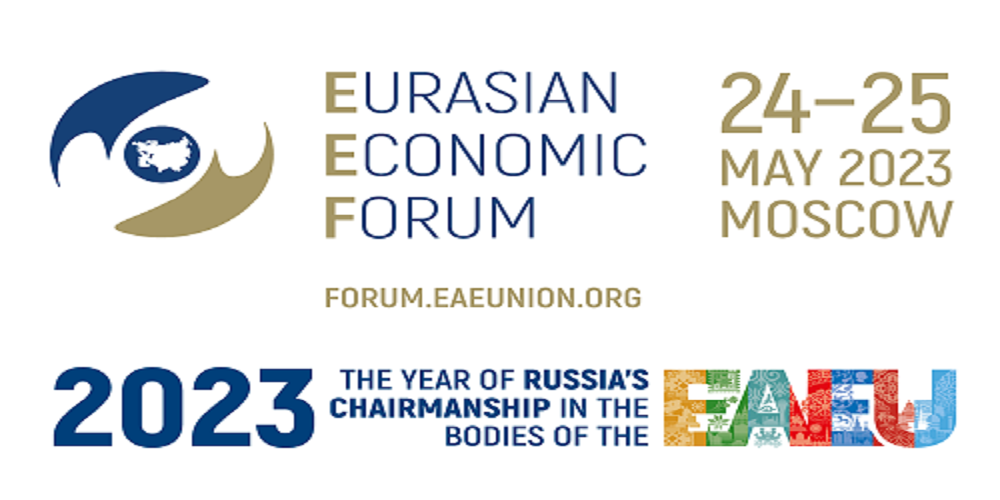Human capital development, technology cooperation, the future of integration cooperation formats and aspects of digital transformation will be discussed by the participants in the business programme of the 2nd Eurasian Economic Forum to be held in Moscow on 24-25 May. The Forum is timed to coincide with a meeting of the Supreme Eurasian Economic Council with the participation of heads of member and observer states of the Eurasian Economic Union. The operator of the event is the Roscongress Foundation.
“The Eurasian Economic Forum aims to cover the most important areas of interaction within the EAEU. The programme of the Forum will address issues of scientific and technical cooperation and the development of joint approaches in industry, environmental protection and energy, as well as problems of technical and customs regulations and the organization of the internal market of the states. Another important task of the Forum is to create a platform for establishing contacts between business and government agencies. I am confident that the Forum will enable us to work out specific solutions in all spheres of multilateral cooperation,” said Mikhail Myasnikovich, Chairman of the Board of the Eurasian Economic Commission.
The theme of the Forum is ‘Eurasian Integration in a Multipolar World’. The key event will be the plenary session of the Forum. A total of about 35 sessions will take place within the Eurasian Economic Forum 2023, which will be divided into seven thematic areas.
In the ‘Human Capital’ track, experts will discuss the prospects for unlocking the tourism potential of EAEU countries, working with young talent, labour migration issues, inter-university scientific and technical cooperation and practices of countering the coronavirus pandemic.
Discussions within the ‘Technology and Cooperation’ track will focus on technological sovereignty as a guarantee of energy and food security, environmental regulation, food market organization and the development of entrepreneurship in a new environment. In addition, experts will discuss aspects of the Common System of Technical Regulation in the Eurasian Economic Union and the removal of barriers to trade, as well as standardization as a tool to ensure the safety and quality of products.
Participants of the sessions under the track ‘The EAEU in a Changing World’ will consider key areas of cooperation between the EAEU, the SCO and BRICS, as well as monetary and financial cooperation and transition to new forms of settlements in mutual trade. Business dialogues will also be held on cooperation of the Eurasian integration format with Indonesia and Latin American countries.
Sessions of the track ‘Eurasian Collectiveness’ will cover key issues of the digital agenda: state regulation of the IT industry, personal data turnover within the EAEU and independence of the integration union countries from import in the software and telecommunications equipment markets. Discussions within this track will also focus on international settlements and digital assets, e-commerce, the creation of the Eurasian Reinsurance Company and new data sources in EAEU statistics.
Participants in the track ‘The EAEU Internal Market, Cooperation in Customs, Competition, and State Procurement’ will discuss the improvement of the Union’s legislation in the context of modern challenges and customs regulations, digital systems for detecting bid rigging and the digitalisation of public procurement.
The strategic section will be a platform for discussing the EAEU 2030+ Strategy. Participants will answer questions on what should be the EAEU’s key development objective until 2045, what specific steps need to be taken to ensure that the development objectives of the integration association are achieved, and what are the new directions of the EAEU’s strategic development.
The Eurasian Economic Forum will host the ‘Green Eurasia’ Competition, ASI Business Breakfast to discuss new opportunities for international cooperation in Eurasia, and the EAEU-Indonesia Business Dialogue Business Breakfast.
In addition, the EAEU Business Council’s programme is scheduled to include two events: a session dedicated to entrepreneurship as a driver of Eurasian economic integration and a meeting of the Presidium of the EAEU Business Council.
The 2nd Eurasian Economic Forum and the meeting of the Supreme Eurasian Economic Council are held as part of the Russian Federation’s presidency in the bodies of the Eurasian Economic Union in 2023. The aim of the Forum is to improve cooperation ties in the Eurasian space.

